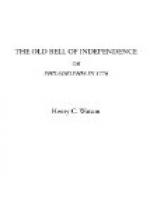“I do. I shall never forget the death of either of them,” replied Higgins. “Poor Frank used to be the butt of the regiment.”
“And why shall you always remember the death of those two men?” inquired Mr. Jackson Harmar.
“Well, from peculiar circumstances connected with them,” replied Higgins. “However, your father knew them most intimately, and he can tell you more about them than I can.”
“Come, father, we call on you for the story,” said Mrs. Harmar.
“You shall have what I can recollect of it, my child. My memory won’t pass muster any more; but if there’s one event that will never escape its grasp, it is the singular death of Jonathan Riley. He was a sergeant in our regiment.
[Illustration: RILEY GOING TO THE PLACE OF EXECUTION.]
He had served in the old French war, and, being a man of tried courage and presence of mind, he was usually selected for dangerous and trying situations. He was at length placed on a recruiting station, and in a short period he enlisted a great number of men. Among his recruits was Frank Lilly, a boy about sixteen years old, who was so weak and small that he would not have passed muster if the array had not been greatly in want of men. The soldiers made this boy the butt of their ridicule, and many a joke was perpetrated at his expense. Yet there was a spirit in the boy beyond his years. Riley was greatly attached to him; and it was reported, on good authority, that he was the fruit of one of Riley’s love affairs with a beautiful and unfortunate girl.
“Often on our long and fatiguing marches, dying almost from want, harassed incessantly by the enemy, did Riley carry the boy’s knapsack for miles, and many a crust for the poor wretch was saved from his scanty allowance. But Frank Lilly’s resolution was once the cause of saving the whole detachment. The American army was encamped at Elizabethtown. The soldiers stationed about four miles from the main body, near the bay that separated the continent from Staten-Island, forming an advance picket-guard, were chosen from a southern regiment, and were continually deserting. It was a post of some danger, as the young ambitious British officers, or experienced sergeants, often headed parties that approached the shore in silence, during the night, and attacked our outposts. Once they succeeded in surprising and capturing an officer and twenty men, without the loss of a man on their part. General Washington determined to relieve the forces near the bay, and our regiment was the one from which the selection was made. The arrangement of our guard, as near as I can recollect, was as follows:




